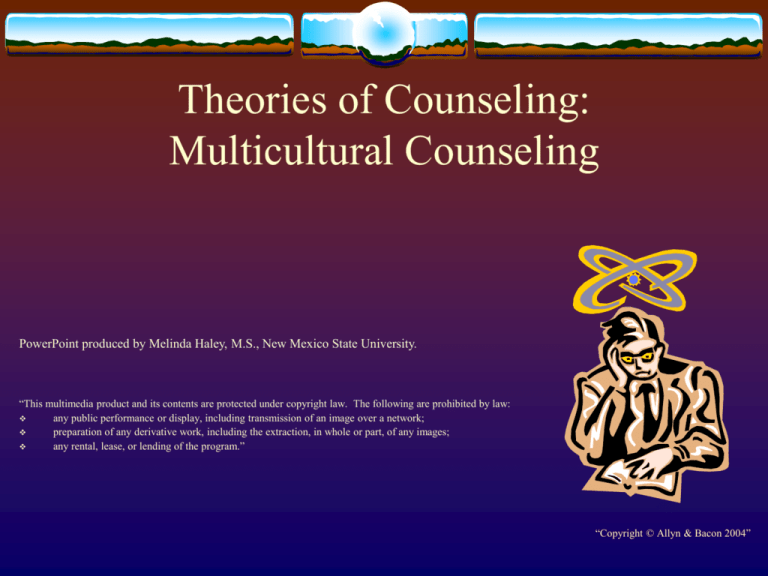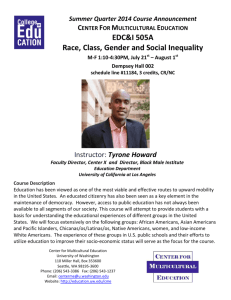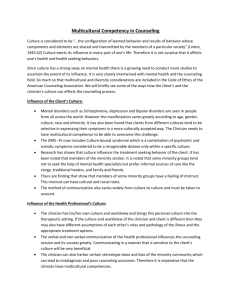Theories of Counseling
advertisement

Theories of Counseling: Multicultural Counseling PowerPoint produced by Melinda Haley, M.S., New Mexico State University. “This multimedia product and its contents are protected under copyright law. The following are prohibited by law: any public performance or display, including transmission of an image over a network; preparation of any derivative work, including the extraction, in whole or part, of any images; any rental, lease, or lending of the program.” “Copyright © Allyn & Bacon 2004” Multicultural Counseling Multicultural Counseling and Theory (MCT) All helping methods exist within a cultural context. MCT recognizes the differences among and within clients. Looks at how family and cultural factors affect one’s worldview. MCT came from the recognition that many theories were empirically validated on white middle-class males and therefore may not work as well with people who are from other diverse groups. “Copyright © Allyn & Bacon 2004” Multicultural Counseling Multicultural Counseling and Theory (MCT) Therapists strive to liberate clients from personal, social and economic oppression. Clients are liberated from self-blame and shown how their problems often exist in a social context. Independence is basic to philosophy and action in MCT. “Copyright © Allyn & Bacon 2004” Multicultural Counseling Approaches to Multicultural Counseling and Theory (MCT) The Universal Approach: Culture is define in a broad, inclusive and universal way. Teaches about the danger of stereotyping. Emphasizes the importance of language and loyalty to one’s own cultural group. Provides information about acculturation and oppression. Discusses the importance of gender roles. Facilitates identity development. Builds self-esteem and awareness. Facilitates understanding of worldview. “Copyright © Allyn & Bacon 2004” Multicultural Counseling Approaches to Multicultural Counseling and Theory (MCT) The Focused Culture-Specific Approach: The counselor examines his or her own racial beliefs and attitudes. Discusses racially relevant topics and is willing to work on issues of oppression. The counselor views clients on two levels: Individual and as members of a group. “Copyright © Allyn & Bacon 2004” Multicultural Counseling Multicultural Counseling and Theory (MCT) as Metatheory MCT recognizes culture as an internalized, subjective perspective formed against a backdrop of contrasting cultural backgrounds. Points out the importance in seeing the individual in context. It is concerned with cultural intentionality. Traditional theories are modified in ways that show respect for human diversity. “Copyright © Allyn & Bacon 2004” Multicultural Counseling Nwachuku,s Theory for Generating Theory and Practice for other Cultures Besides Your Own. Examine the culture in question: What are the important personal and interpersonal aspects of this culture? Utilize field research, interviews and anthropological readings. Identify concrete skills and strategies that can be used in helping. Test the new helping theory and its skills. This framework can be applied to a variety of cultural contexts. “Copyright © Allyn & Bacon 2004” Multicultural Counseling The Microskill of Focusing and MCT An individually balanced focus among individual, family and cultural expectations is needed when counseling clients from various cultures. A significant part of any session needs to address the issues of significant others, and cultural, environmental and contextual issues. Self-in relation to, connectedness, relationship and interdependence all need to be considered. “Copyright © Allyn & Bacon 2004” Multicultural Counseling Introspective Developmental Counseling Naikan Therapy: Is aimed at assisting clients in finding meaning in their lives and in repairing damaged relationships. It moves the client from self-centeredness to awareness of interpersonal relationships. Introspective Developmental Counseling and Life Review: Tamase’s work combines Eastern and Western frameworks. Erikson’s has received criticism because it is grounded on a Northern European, U.S. white male model. “Copyright © Allyn & Bacon 2004” Multicultural Counseling The Integrative Life Pattern Model This is a decisional counseling model that raises a person’s awareness of multicultural issues. A lifelong pattern of identifying our primary needs, roles and goals and integrating these within ourselves, our work and our family. Clients make decisions about their total development: Physical, intellectual, social/emotional, vocational, sexual etc. Four major life roles: Loving, learning, labor and leisure. “Copyright © Allyn & Bacon 2004” Multicultural Counseling Cultural Identity Development Theory This is a cognitive, emotional and behavioral progression through stages of awareness and involves different attitudes towards oneself at the different stages. Generally the stages are: Awareness of self as a cultural being. Encounter with cultural issues. Naming of these cultural issues. Reflection on the meaning of self as a cultural being. Internalization about self-in-system. “Copyright © Allyn & Bacon 2004” Multicultural Counseling Constructing Culturally Appropriate Techniques and Strategies Implies a nonhierarchical relationship between counselor and client. Counselors modify their techniques and strategies to fit the client rather than making the client fit the therapy. Takes into consideration that what may be appropriate for one client in one cultural context may be inappropriate for another client in another cultural context. “Copyright © Allyn & Bacon 2004” Multicultural Counseling Feminist Therapy as an Example Feminist therapy utilizes: Egalitarian relationships Pluralism An external emphasis Use of community resources Active, participatory counseling style Information giving Personal validation Adds the concept of “power” missing in other theories. Works within a community context. Multicultural Counseling MCT Practice and Multiple Helping Roles Network Therapy: Integrates community relationships and community into family therapy. Can include the nuclear family, extended family, important neighbors, and key figures from the community (priest, teacher, the police etc.) One focus is to help the client build meaningful community and interpersonal relationships to foster positive mental well-being. “Copyright © Allyn & Bacon 2004” Multicultural Counseling Points to Remember with Network Therapy Don’t expect to do it all yourself. Network therapy utilizes a treatment team. Use multiple theoretical approaches. Different theories may be beneficial at different times with the same client. Consider the value of network treatment for all clients. People do not live in vacuums and their issues or problems affect others around them. “Copyright © Allyn & Bacon 2004” Multicultural Counseling Family Therapy and Multicultural Issues The multicultural treatment of choice is often family therapy. Family is defined culturally and the roles, relationships and rules can be different among and between cultures. Cultural expectations play a role in every family and group experience. A significant component of our self-concept is derived from our ethnic heritage. Ethnic heritage also can shape our attitudes and beliefs. “Copyright © Allyn & Bacon 2004” Multicultural Counseling Traditional Healing Usually based on the epistemology and belief system of the culture. Counselors may sometimes need to work with traditional healers (e.g. a medicine man) in order to best serve the client. Traditional healers have always included family and the larger community in treatment. As Western theories begin to do so also, these two approaches are becoming closer. It is important not to adopt traditional practices without first consulting with the host culture to show the proper respect for their traditions. “Copyright © Allyn & Bacon 2004” Multicultural Counseling Liberation of Consciousness: Self-in-Relation Freire’s Five Levels of Consciousness: Naïve consciousness: Blame for oneself for one’s condition. Identification with the oppressor: The oppressed find within the oppressor their model of “personhood.” Anger: As one discovers one’s level of oppression, one becomes angry. Reflection on the self as a cultural being: This leads to action. Sees self-in-system: Personal identity is made by the self in relation to… “Copyright © Allyn & Bacon 2004” Multicultural Counseling Multicultural Respect Religion/Spirituality Sexuality Identity Ethnic/Racial Identity Trauma Language Location of Residence Economic Class Psychological Maturity Chronological Challenges Family History Unique Psychical Characteristics Identify your own level of cultural identity in relationship to each of the above concepts. “Copyright © Allyn & Bacon 2004” Multicultural Counseling The Foundational Concepts of Empathy and Multicultural Competence Acceptance is the foundation of empathy. The feelings you experience within yourself are the key to your own degree of acceptance toward others. Roger’s core conditions form the backbone for empathic relationships. Counselors need to be aware of their own cultural values and beliefs. Counselors need to be aware of their client’s worldview. Counselors need to use culturally appropriate intervention strategies. “Copyright © Allyn & Bacon 2004” Multicultural Counseling Relating Educational Method to Counseling Theory and Practice Inviting a narrative. Reexperiencing the sensory dimensions of cultural identity issues. Making the narrative concrete and specific. Moving to a reflective consciousness. Seeing self-in-relation or self-in-system. “Copyright © Allyn & Bacon 2004” Multicultural Counseling Limitations of Multicultural Counseling and Theory (MCT) The counselor needs to be highly competent in traditional theory. The counselor needs to have a in-depth understanding of MCT metatheory. The counselor needs to develop a knowledge of many different cultures. There is a small research base on MCT It challenges traditional therapies. It can be difficult for practicing counselors to incorporate it. “Copyright © Allyn & Bacon 2004” Multicultural Counseling Strengths of Multicultural Counseling and Theory (MCT) It is a theoretical orientation in and of itself. It provides a framework to address the needs of the culturally different and provides an alternative to theories empirically validated on white, middle-class males. Numerous interventions can be applied through this approach. It is flexible and considers the needs of the individual in relationship to the community. “Copyright © Allyn & Bacon 2004” Resources Ivey, A. E., D’Andrea, M., Ivey, M. B. and Morgan, L. S. (2002). Theories of counseling and psychotherapy: A multicultural perspective, 5th ed. Boston, MA.: Allyn & Bacon. James, R. K. & Gilliland, B. E. (2003). Theories and strategies in counseling and psychotherapy, 5th ed. Boston, MA: Allyn & Bacon. Kottler, J. A. (2002). Theories in counseling and therapy: An experiential approach. Boston, MA: Allyn & Bacon. “Copyright © Allyn & Bacon 2004”






